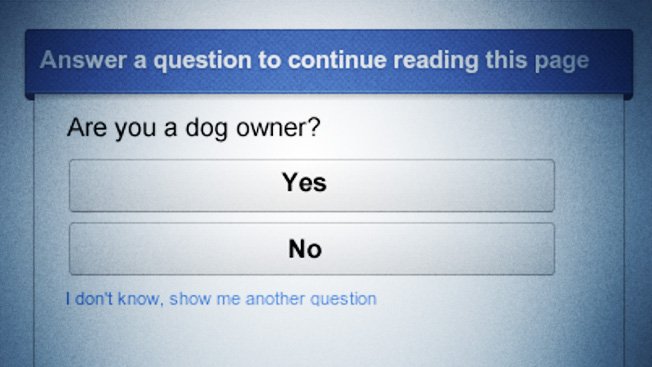
Google has long been accused of being a content stealer and/or a value destroyer in certain publishing circles. Mark Cuban, the outspoken head of HD Network and the Dallas Mavericks, has referred to Google derisively as a “vampire,” going as far as urging newspapers and their brethren to block Google from linking to their sites.
But as it turns out, Google really wants to save the digital publishing business. In fact, the search behemoth today will roll out a new product aimed at helping struggling traditional and digital publishers to make money on their Web content.
The new product, Google Customer Surveys, is being billed as an alternative revenue model for publishers weighing whether to erect paywalls on their sites. Here’s how it works: When users visit the Web sites of partners like the New York Daily News and the Texas Tribune, they’ll find some articles partially blocked. If they want to continuing reading, they’ll have to answer a question, or microsurvey, courtesy of Google.
The multiple-choice questions will be on market research, along the lines of "Which of these types of candies do you usually buy for your household?" The choices for that question include "None, Hard candies, Jellies, Licorice, Toffees."
Another question: "Have you had personal experience with filing lawsuits? Please check all that apply."
What’s in it for publishers? Advertisers pay Google to run the surveys, and Google pays sites 5 cents per response. For sites with a lot of traffic, that can add up to serious cash. Publishers can implement Google Customer Surveys on as many stories they’d like—as is the case with partner LimaOhio.com—or in a metered, frequency-capped fashion (as is the case with Adweek.com).
“This is a new way to monetize digital content without a paywall,” explained Google product manager Paul McDonald. “It’s important to Google that there is high quality content on the Internet.”
As for advertisers, Google sees Custom Surveys as appealing to the thousands of small- and midsized businesses that have been the backbone of the company’s search ad business. The thinking, according to McDonald, is that most of these companies can’t afford or would never even considering hiring a market research firm like Millward Brown. But everybody in marketing likes research. And this new product allows companies to automatically create anonymous surveys via a self-serve Web interface, just like when they buy Google keyword ads.
But do users want to answer questions that will in some cases appear inane or random? For instance, the survey questions will have nothing to do with a site’s content. Won’t users become blind to surveys, as they are blind to banners?
McDonald said that Google is taking steps to make the questions as engaging as possible. And if users start to just answer the first question on each page, or answer too quickly, the program will pick up on that and force readers to answer new questions.
“We really want this to work for our readers,” said McDonald.
Not to mention publishers. So far, the list of participants is small. Besides a few newspapers, Google says it has signed up Pandora. Plus, according to McDonald, sites that already employ subscription walls can potentially participate in Google Customer Surveys. Google has had ongoing conversations with The New York Times and The Wall Street Journal, McDonald said.
However, while those publishers are surely looking for more revenue streams, just about every Web publisher is hoping that revenue comes from the long-awaited influx of brand ad dollars. It’s curious that Google focused on market research and didn’t elect to test a product that provides users access to content in exchange for viewing a display ad or watching a video spot.
“We really came at this project from the reader’s perspective,” said McDonald. “We were looking to minimize the time between the surveys and content. We feel like spending six to eight seconds on a survey is a good tradeoff compared to watching a 30-second ad.”
As for Google’s own ad products, the company is emphasizing that all surveys will be completely anonymous, and that Google will not use any data collected for its own ad targeting.